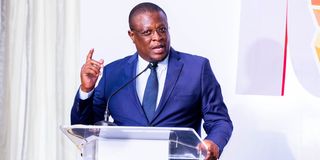Tanzania to share broadband infrastructure with DRC and South Sudan

Minister of Information, Communications, and Information Technology, Nape Nnauye. PHOTO | COURTESY
What you need to know:
- The Memorandum of Understanding (MoU) worth $28 million (Sh71 billion), in collaboration with Tanzania Telecommunication Company Limited (TTCL), presents a significant opportunity to establish connectivity between the Democratic Republic of Congo (DRC) and South Sudan.
Dar es Salaam. Tanzania is planning to share its National Backbone Infrastructure with the Democratic Republic of the Congo (DRC) and South Sudan, following the signing of a bilateral Memorandum of Understanding (MoU) with neighbouring Uganda.
This was disclosed yesterday during the signing of the MoU between Tanzania and Uganda in front of the respective ICT ministries.
Information, Communications and Information Communications Technology (ICT) minister Nape Nnauye said during the event that the $28 million (Sh71 billion) MoU would be followed by the opportunity to link the DRC and South Sudan.
“ICT connections with Uganda will create another connection opportunity with other countries. The government will continue investing in infrastructure management in order to increase productivity,” he said.
He said Uganda’s decision will consolidate the strengthening of ICT infrastructure between the two countries, noting that it will also open a new chapter for economic and business cooperation as well as growth and enhancement.
The decision will also strengthen brotherhood and cooperation through enhanced communications among the entire East Africa Community (EAC), according to him.
Furthermore, Mr Nnauye, who doubles as a Mtama Constituency legislator, called on EAC countries to continue investing in technology in order to improve technological systems and expertise in the sector.
He said that in order to strengthen the country’s communication in the region, the government has recently signed an MoU with Malawi on Communication and Digital that would ensure that the two countries are connected on the data corridor.
In addition, the government has inked contracts with five telecom companies for the building and upgrade of 758 communication towers.
“This shows that the sector of technology has been well managed. The decision to provide the Tanzania Telecommunications Corporation (TTCL) with a mandate to manage the National Broadband Backbone was good,” he said.
He urged TTCL to effectively honour the signed MoU with Uganda and ensure that Uganda should be provided with services according to agreed terms and conditions.
Uganda should give testimony about the good service offered by Tanzania as compared to other countries, according to Mr Nnauye.
During the event, Uganda’s minister for Information Communications Technology and National Guidance, Mr Chris Baryomunsi, said the MoU marks a significant milestone in strengthening ties between the two nations.
“We must also link the internet with South Sudan, the DRC and other African countries. This will bridge digital devices, boost innovation and stimulate economic growth,” said Mr Baryomunsi.
He noted that Africa is surrounded by oceans consisting of various on-ground cables, more than what is underneath, noting that there is a need for interconnectivity in Africa so that the cables generally remain on the ground and get the continent connected and linked.
Furthermore, he said the MoU represents partnership on shared value, saying therefore that Uganda was committed to collaborating with the development and sharing of national ICT infrastructure in underserved areas.
He noted that they will work closely to enhance cyber security capabilities and protect shared ICT from threats. According to him, the two sides will collectively invest in human capital development and exchange of knowledge programmes to ensure the work force is well-equipped with a sense of digital economy, job creation, fostering innovation, and regional integration.
Mr Baryomunsi said the MoU comes with the responsibility of transforming people’s lives through enabling opportunities.
“Technology is moving fast; the fourth industrial revolution is now giving a chance to the fifth revolution. We should work hard to ensure the technology doesn’t remain in textbooks; rather, it should be translated into reality,” he said.




